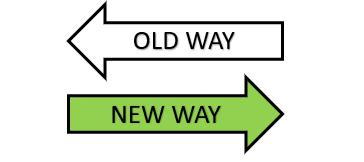
As the world of work is rapidly changing, so must leaders.
There is a better and more compassionate way to lead that deepens trust and unleashes the potential to drive tangible business results. This evolution in leadership is urgently needed today as we face rapid change, increased uncertainty, and record levels of employees who are stressed out, burnt out, moving on, or ‘quiet quitting.’
To describe this shift in the workplace, we can use the terms ‘Old Energy’ and ‘New Energy’, where:
- Old energy organizations operate in command and control, have strong hierarchies, and rely heavily on goal-oriented performance management, versus
- New energy organizations that focus on developing their employees have a compelling purpose that speaks to employees and customers, and live their values through respect, humility, and open-mindedness.
Perhaps you’ve heard that there are only two basic emotions: fear and love, and all other feelings stem from one of these core emotions. Applying this approach to organizations, one could say:
- Old energy organizations are driven by fear (and related emotions, such as anxiety, frustration, competition, and ego), whereas,
- New energy organizations are led by love (and associated emotions like compassion, gratitude, trust, and creativity).
(Rarely do we talk about love in a work context. But we do talk about empathy, trust, compassion, humility, patience, and honesty – all derived from love. Pick the word that works for you when you think of the feeling you have when you belong and feel valued and respected.)
To put it more clearly:
Old Energy Organizations...
- Feel heavy – the environment does not encourage innovation or the free flow of ideas.
- ‘We have always done it this way.’
- Compliance and control are vital components above the critical aspects of safety, finance, and privacy.
- Rely heavily on rules and procedures.
- Criticism is common. People feel judged.
- Focus on Performance Management instead of a coaching culture.
- Utilize discipline as a primary means to improve performance.
- Perfectionism is prevalent.
- Lack of genuine honesty.
New Energy Organizations...
- Focus diligently on personal development.
- Have defined values practiced by guiding principles.
- Strategic focus on leadership development, covering non-traditional topics such as:
- Vulnerability
- Trust
- Empathy
- Neuroscience (Neuroplasticity)
- Compassion
- Courage is articulated, explored, and encouraged at all levels.
- Discipline is rarely required and is the last resort – most people self-declare.
- Hierarchy exists for structure and difficult decision-making but not for control or inappropriate use of power.
- Fear is never used to motivate or control.
- Making mistakes is part of the process.
- Celebration is a key component of the culture.
What type of organization would you prefer to work for?
What might happen if - regardless of where your organization falls on the old vs. new continuum today - it shifted closer to the 'new energy' side?
Perhaps you might see higher employee engagement. Less turnover. Fewer sick days. More joy in the workplace.
Imagine if employees showed up to work each day and willingly gave more of their talents and abilities to improve corporate performance.
It can happen. It does happen. And the shift starts with one leader at a time.
Contact me to find out how you or your organization can benefit from culture transformation work.
